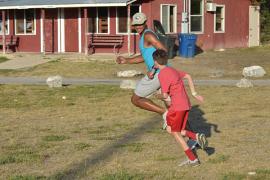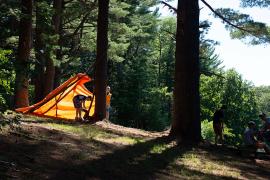The COVID pandemic made some things — including how quickly life can change — come into stark contrast. Suddenly front and center was the fact that no matter how perfectly planned we believed life was, its machinations were far beyond our actual control. Ruminating on this the other day (and full disclosure, whilst grumbling about staffing shortages and hiring strategies), I found myself wondering how my view of the working world might be different if I, too, had started working at a time where it felt like any day in the future might unknowingly be the last day I recognized as normalcy.
How would my view of the hours I put into a job — by definition, something one does with the purpose of making sure they can pay for their basic needs — be different if I had not been working “for the experience”? What if I had not been truly excited and frankly, honored, to earn the equivalent of about twelve cents an hour just to be able to say I had finally made it . . . I was a camp counselor!
Today’s generation doesn’t have the luxury of just working for the experience. And for our high-school and college-age staff, many of their first jobs happened at a time when the word pivot wasn’t just a buzz word, it was a survival strategy. Imagine if, at 18 years old, a main takeaway from your first job was watching your boss include all workers, regardless of experience or seniority, in the problem-solving. Seeing your supervisors try and fail to change a process, then try again and be OK with something that was “good enough.” Learning that in order to survive through chaos, the workplace needs to be flexible, open to innovation, and willing to go with the flow.
Let’s be honest: that’s not how most camps would describe their operations. In general, as an industry, we run on schedules, organization, and efficient management of programs and clientele. We have a workforce that must come together quickly and in a short time is expected to pull as a team and work as a cohesive unit, and we don’t have time to wait for the ones in back to catch up. We rely on years — in some cases, decades — of tradition; change, in some instances, comes slowly and even reluctantly.
Imagine now how it must feel for a staff member — who just watched their off-season job turn everything upside down to remain viable — when we rigidly explain that at camp, they must work an entire summer, that time off cannot be flexed, that adjustments for their priorities are not the camp’s priority, and so on. The world is full of workplaces that are figuring out how to attract and retain the younger post-COVID workforce. And we as an industry must do the same.
“Quiet quitting” — a concept that generally refers to an employee who is completing all their assigned tasks but is not going above and beyond (Rosalsky & Selyukh, 2022) — isn’t the problem. Being stuck providing the “opportunity to make a difference” (appealing to two generations ago) or to “work hard and see the tangible results of their efforts” (reaching back three generations) or even to “give for the greater good” (so last century) simply doesn’t appeal en masse to this generation. So if we understand that what does appeal to them — work/life balance, prioritizing mental wellness, and doing “enough” but not “more than enough” — we realize that it is the camp’s expectations that need to shift. Because these young adults see the working conditions we offer — unending hours, short breaks, inflexible time off, meals inhaled quickly if at all while exhorting 20 kids to please just drink your milk — as not so different to how we saw those early 1900s factory jobs from our history books: as a hazard to human happiness.
Now, I’m from the generation that got myself ready for school and came home to babysit other neighborhood kids, who had a key to my house on a lanyard by age nine, rode my bike where I needed to go and could be trusted to come back when the street lights came on (no, that’s not just a meme). I believe that a solid work ethic is a core, key element to a productive life. But as I watch younger generations at work be so willing to walk away and put themselves first, I have to ask myself: why can’t I? Why is it always me when nobody else can do it? Why can’t I put other priorities ahead of what camp needs, even when it is wearing me out?
Well, for one reason, I have my parents, teachers, mentors and the people who raised me still in my ear: “When you make a commitment, you stick it out.” “Your word is your bond.” I’m beholden to those values and nobody can begrudge me that, just like I couldn’t be mad at my grandparents, who were raised during the Great Depression, for insisting I always have some cash hidden in a coffee can because “you just never know what can happen.” So how can I judge, or begrudge, a younger generation who hears their parents saying “your health is more important than the end result?” or “You have to take care of yourself to take good care of others.” Those are lessons I’ve clawed my way to learning over decades in the working world. Is it so bad if our young people don’t have to struggle to learn it the hard way?
The reality is our staff aren’t “quiet quitting” — they’re never actually committing to do what we’ve come to expect. They’re accepting a job to try it, and when they realize that it does not provide balance, they’re leaving. So if we think this movement is “quiet,” we’re just wrong. It’s not quiet; it’s not even slightly hidden. It’s this generation of humans blatantly telling us: “if you try to get me to work the way you worked, I might be willing to try it . . . but not for long.” Just as this generation is not willing to passively wait for climate action, equality, and other fundamental issues to change, they are not willing to do what they consider to be wasting their time in a job that doesn’t engage their sense of justice, purpose, and whole self.
I don’t pretend to have all the answers. In my role as a camp professional and leader of an organization, I struggled mightily with the changes I’ve seen among staff teams over the past 20 years. For many of those years, I wasted time asking why they couldn’t hack it. Why can’t they work as hard or do as well as our teams from 10 or 15 years ago? Recently, I realized I was asking the wrong question. It doesn’t matter why as much as it matters what we can do to meet people where they are.
When campers are struggling, we don’t simply demand that they change. In many cases, we go to the ends of the earth to shift systems and supports to help them succeed. Perhaps this is also the main way we should look at engaging a successful workforce. This generation has taken a figurative step back and identified by their approach to work what their priorities are going to be. As we look toward a new hiring season and begin putting together our 2023 teams, what can we do to take literal steps forward into meeting them on this journey to the camp workplace of the future?
Reference
Rosalsky, G. & Selyukh, A. (2022, September 13). The economics behind 'quiet quitting' — and what we should call it instead. NPR. npr.org/sections/money/2022/09/13/1122059402/the-economics-behind-quiet-quitting-and-what-we-should-call-it-instead
As Founder of Bright Moose LLC, Emily provides training, consultation, and PD for camps, schools and youth orgs. She has 20+ years of leadership experience, including 15 as executive director at Camp Starfish (NH). She sits on the Board for NHCamps and is a visitor, committee member, NCDW faculty, and facilitator for ACA New England. You’ll find her in Camping Magazine, ParentingNH, the Project Real Job Blog, and on the Day Camp Pod. She is an avid collector of terribly awesome puns. For more information or to contact Emily check out brightmoosetraining.com.
This blog was written on behalf of ACA's Project Real Job, whose goal is to support camps in their efforts to recruit, hire, and retain staff.
To gain more understanding about the generational differences that are challenging camps and keep the peace when the expectations of young staff threaten to dismantle the traditions cherished by older staff (without the endless game of tug of war), join us for the upcoming Staffing Summit with opening keynote speaker, Sarah Sladek. Sarah is a renowned generational and employee engagement researcher who has worked with organizations worldwide. She brings to the stage a solution-oriented approach to increase employee engagement and foster multi-generational team building.
Photo courtesy of North Star Camp for Boys in Hayward, WI
The views and opinions expressed by contributors are their own and do not necessarily reflect the views of the American Camp Association or ACA employees.




